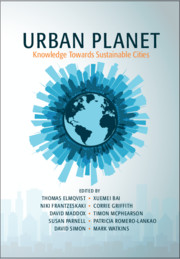The role models of smart cities as technological utopias have changed over the last 28 years from tech titans such as IBM and Cisco, with their wonderful levels of innovation, to do-it-yourself entrepreneurs. A wide range of activists, entrepreneurs, and civic hackers are tinkering their way towards a different kind of technological utopia, and are reimaging the smart city concept through prominent enablers such as smartphones, low-cost broadband, open data, and open-source technologies (Shueh Reference Shueh2015). Local governments, with the assistance of large-scale and expensive technologies, have always shaped urban and suburban infrastructures. “Urban tech” describes the emerging technologies that are being used to solve problems at the intersection of urbanization and sustainability, from reducing energy use and greenhouse gas emissions to reducing crime and increasing government efficiency (Baptiste Reference Baptiste2015). Accordingly, urban tech startups develop creative solutions to the urban challenges that all citizens face; their concepts have widely transferable applicability in the urban-centric areas of mobility, economic development, sustainability, and urban services (Stephens Reference Stephens2014).
One smart city trend identified by the International Data Corporation, or IDC, predicts a growing adoption and awareness of the smart city concept by an expanding set of government leaders. This demand for strategy development and implementation road maps includes a wide range of actors, from cities and counties to states and central or federal government agencies. IDC predicts that by 2017, at least 20 of the world’s largest countries will create national smart city policies to prioritize funding and to document technical and business guidelines (Yesner Clarke Reference Yesner Clarke2015). Based on the benefits of Urban Tech for achieving sustainable development, it’s strongly recommended that local governments promote friendly environments for meeting technology entrepreneurs’ needs, such as setting rules, regulations, policies, and even easy access to technical requirements. Furthermore, by unlocking important public information and supporting policies of Open Government, urban managers will democratize access to services; enable innovation that improves the lives of citizens; and increase transparency and efficiency (NYC Digital 2011).
Most urban tech startups are less than a decade old, but they are already dramatically reshaping how citizens move around and reduce their energy consumption and carbon footprint (Abrahamson Reference Abrahamson2015). For instance, Uber is a mobile app that connects passengers with drivers for hire. One of Uber’s stated visions is providing a simpler form of transportation while creating economic opportunities for all. In addition to these goals, they have set a target of promoting environmental sustainability (“Uber (company)” 2016). Rachio allows users to remotely control home watering systems for lawns or gardens. The Rachio app works through a connection to Rachio information through home Wi-Fi and automatically adjusts for the right amount of water needed for lawn and water savings. Waze is a free mobile navigation app for smartphones that allows drivers to use live maps, real-time traffic updates, and other road data. Traffic slows citizens down and pollutes cities. This app brings drivers together to find the best alternatives. (Urbantech Radar 2016). No one can predict what the future of cities will look like – but we can get a glimpse of what’s possible by looking at some of the fastest growing startups currently reshaping the way people live and work in cities. The way cities work with emerging technologies is entering a new paradigm in which the city is not only the customer but, more often, the regulator and promoter of the best ideas as well (Baptiste Reference Baptiste2015).

